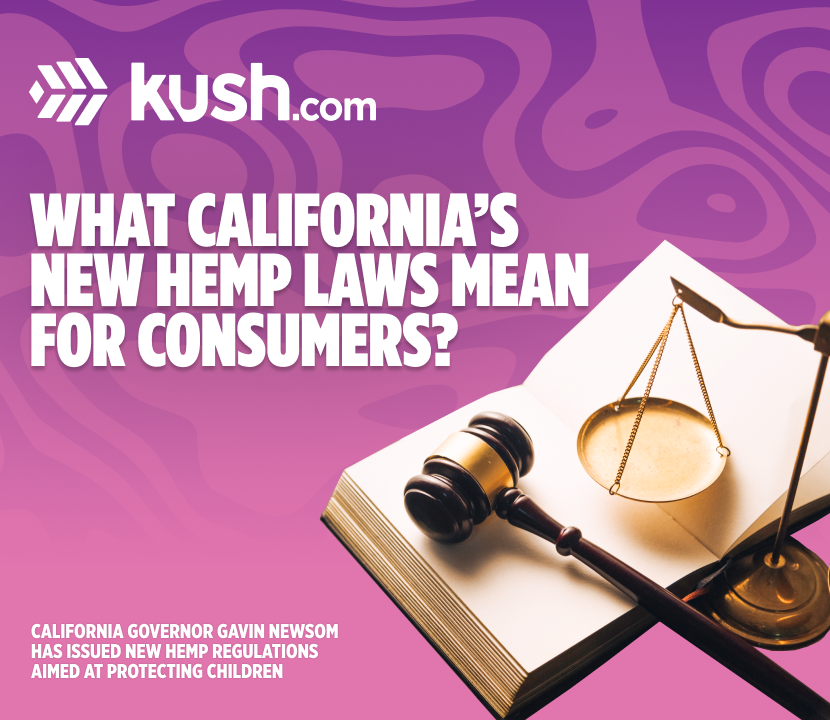
California Governor Gavin Newsom has issued new hemp regulations aimed at protecting children from dangerous hemp products. These changes limit the number of intoxicating hemp products to five per package and introduce stricter labeling requirements. But how will these rules affect how you buy hemp products—and what do they mean for the businesses you trust?
California will not stand by as hemp businesses bend laws to target kids with dangerous products containing THC.
The state is banning the sale of edible hemp products with THC and setting the minimum purchasing age for all other edible hemp items at 21. pic.twitter.com/WNa6QfF6eB— California Governor (@CAgovernor) September 6, 2024
In this article, we’ll break down how these new rules impact both consumers and the hemp industry, compare California’s regulations with those of other states, and explore the broader implications for hemp legislation nationwide.
These new regulations offer peace of mind for consumers, especially parents. With more explicit labeling and stricter limits on product packaging, there’s less risk of accidental exposure to dangerous or intoxicating hemp products. Parents can be more confident that the products they bring home are clearly marked, reducing confusion around what’s safe for their household.
This could lead to a shift in consumer behavior. Those who may have hesitated to purchase hemp products in the past due to safety concerns might feel more comfortable now that these new measures are in place. The regulations also allow consumers to become more aware of what they’re buying—encouraging them to seek products from companies that follow these enhanced safety guidelines.
If you’re looking for compliant, high-quality hemp products, check out our products on Kush.com, where we prioritize safety and quality.
$29.99 Original price was: $29.99.$20.00Current price is: $20.00.
$29.99 Original price was: $29.99.$20.00Current price is: $20.00.
$29.99 Original price was: $29.99.$20.00Current price is: $20.00.
As with any major regulatory change, the hemp and cannabis industry in California will need to adapt quickly. Producers, retailers, and dispensaries will be required to implement stricter packaging and labeling procedures to comply with these new rules.
With a cap on the number of intoxicating products per package, companies may have to adjust their product offerings or repackage existing items to align with the new guidelines. Additionally, businesses that fail to comply may face penalties or even product recalls, which could disrupt operations and impact revenue.
However, businesses that proactively embrace these changes could stand out in the market as safe and trustworthy, potentially attracting more cautious consumers. The push for more transparent labeling and responsible product packaging could also set a new standard for transparency, giving compliant businesses a competitive edge in a market increasingly focused on safety.
California isn’t the only state addressing hemp safety; its new regulations place it at the forefront of consumer protection.
Let’s compare this with states like Tennessee, Georgia, and Florida:
By introducing regulations that limit how many products can be sold in a single package, California is setting an example that other states may soon follow.

California’s new hemp regulations could signal the start of broader national discussions about hemp safety and child protection. As other states watch how these rules play out, similar legislation could emerge in places like New York, Washington, or even federally. This might lead to a more standardized approach to hemp regulation across the U.S., simplifying compliance for businesses operating in multiple states.
Additionally, the focus on child safety and responsible product packaging could encourage legislation addressing other consumer health concerns, such as proper dosing information or clearer warnings for adults. As the industry continues to grow, these new regulations could be the first step toward a more regulated, transparent market that benefits both consumers and businesses.
Since the announcement of Governor Newsom’s new hemp regulations, reactions have been pouring in from across the cannabis and hemp industries. While some applaud the move for prioritizing child safety, others express concerns about the impact on the industry and potential overreach.
On social media, experts and activists have shared their thoughts:
Peter Grinspoon, M.D., a Primary Care Doctor and Cannabis Specialist at Harvard Medical School, raised concerns about the broader implications of banning certain hemp products.
He stated:
“This industry is barely regulated (sales & production); thus is poisoning people, but banning seems kind of Drug War-ey…”
Newsom wants to ban intoxicating hemp products. Industry — and some health experts — say he’s going too far#CBD #cannabishttps://t.co/zKReTzjRlw— Peter Grinspoon, M.D. (@Peter_Grinspoon) September 16, 2024
His reaction reflects the ongoing tension between ensuring product safety and avoiding overly restrictive policies that could stifle the industry.
On the advocacy side, Veronica, a Cannabis Activist, highlighted the growing resistance from within the hemp industry itself:
“Hemp and CBD industry advocates are threatening to file lawsuits against California Gov. Gavin Newsom’s emergency rules banning hemp products with any ‘detectable amount of total THC.’”
Veronica’s comment underscores the legal challenges that may arise due to these new regulations, with many in the industry questioning whether this is a step too far.
Hemp and CBD industry advocates are threatening to file lawsuits against California Gov. Gavin Newsom’s (D) emergency rules banning hemp products with any “detectable amount of total THC.” https://t.co/UnPWkWxyep— Veronica (@Veronica2twit1) September 16, 2024
These reactions illustrate the mixed feelings surrounding the new regulations. While some are celebrating the move as a victory for consumer safety, particularly for children, others worry that the rules could hinder businesses and restrict access to legitimate hemp products.
At Kush.com, we’re committed to informing you about the latest developments in the hemp and cannabis industries. Our blog covers everything from product updates to industry news and tips on responsible cannabis use. You’ll find valuable insights that help you navigate this ever-evolving industry.
Looking for compliant, safe hemp products? Visit our shop to explore a wide range of high-quality hemp-derived products that meet California’s new safety standards.
Join our newsletter
Get all the latest news and first access to offers right to your inbox.
802 E Whiting St, Tampa, FL 33602 United States

WARNING: These statements have not been evaluated by the Food and Drug Administration (FDA). The products listed on this website contain cannabidiol(CBD). These products should be kept out of reach of children and animals. If you are pregnant, nursing, taking medications, or have a medical condition, consult with your physician before using these products. Representations regarding the efficacy and safety of CBD have not been evaluated by the FDA. These products are not intended to diagnose, prevent, treat, or cure any disease. These products may contain less than 0.3% THC by dry weight.
©2024 Kush.com | KDC LLC | All rights reserved.